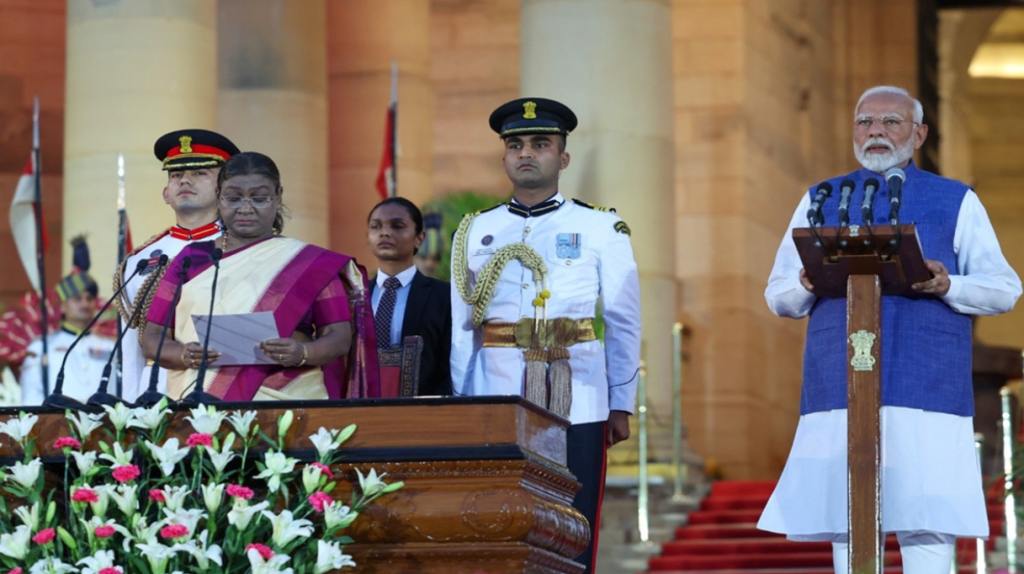India’s 2024 Election
The 2024 Indian General Election witnessed the resounding re-election of Prime Minister Narendra Modi and his Bharatiya Janata Party (BJP), securing a historic second consecutive term. This victory marks a significant milestone in Indian politics, reaffirming the BJP’s dominance on the national stage and ushering in a new era for the country.
The Election: A Tale of Two Narratives
The 2024 election campaign was a fierce battle between two contrasting narratives. The BJP, under Modi’s leadership, championed a potent mix of nationalism, Hindutva ideology, and development-focused policies, aiming to project an image of strong and decisive leadership. They targeted their campaign at the core of their support base – the Hindu majority, particularly in rural areas and smaller towns – emphasizing economic progress, national security, and cultural pride.
On the other side, the opposition alliance, spearheaded by the Indian National Congress (INC), struggled to articulate a unified message against the BJP’s narrative. Despite attempts to coalesce diverse regional parties under their banner, the alliance faced internal discord and struggled to resonate with the electorate. Their campaign focused heavily on criticizing the BJP’s alleged failures in areas like unemployment, inflation, and social justice, but lacked a clear alternative vision for the future.
The BJP’s Winning Strategy
Several factors contributed to the BJP’s electoral triumph. The party capitalized on Modi’s personal charisma and his image as a strong and decisive leader. His “sabka saath, sabka vikas, sabka vishwas” (with everyone, development for everyone, trust of everyone) mantra resonated with a large section of the electorate, promising inclusivity and progress.
The BJP’s campaign centered around a strategy of highlighting the party’s achievements in various sectors, particularly infrastructure development, rural electrification, and social welfare programs like the Pradhan Mantri Awas Yojana (housing scheme) and the Ayushman Bharat scheme (health insurance). This focus on development and tangible improvements in people’s lives resonated with a majority of voters, especially in rural areas where the BJP’s traditional base lies.
Furthermore, the BJP skillfully utilized the power of social media and digital platforms to spread their message and counter negative narratives circulating in the opposition’s camp. Their extensive use of targeted messaging, online campaigning, and strategic media management played a crucial role in influencing public perception.
The Implications for India’s Future
The BJP’s re-election has far-reaching implications for India’s future. It signifies the consolidation of their ideology and policies, setting the stage for a potential shift in the country’s political landscape.
One key area of focus will be the implementation of the BJP’s vision for India’s economic growth. The party’s focus on infrastructure development, digitalization, and attracting foreign investment is likely to continue, with a renewed emphasis on boosting domestic manufacturing and promoting job creation.
The BJP’s ideological stance, based on Hindutva principles and cultural nationalism, is also likely to play a significant role in shaping future policy decisions. This could manifest in areas such as education, religious freedom, and cultural identity, potentially leading to further polarization and societal tensions.
However, the BJP’s victory also presents a challenge for the party to address concerns related to social justice, economic inequality, and environmental sustainability. The party will need to navigate these complex issues carefully, finding a balance between economic growth and social welfare, ensuring that the benefits of development reach all sections of society.
A New Chapter for Indian Politics
The 2024 election results have underscored the BJP’s enduring appeal and its ability to mobilize a substantial portion of the electorate. This victory establishes the party as a dominant force in Indian politics, potentially shaping the country’s trajectory for the foreseeable future.
The BJP’s second consecutive term in office marks a new chapter for Indian politics. The party’s vision, priorities, and leadership will play a crucial role in determining the future course of the country, influencing its economic development, social fabric, and international relations. The coming years will be crucial in observing how the BJP navigates these complex challenges and delivers on its promises to the people of India.
Further Research and Discussion:
The 2024 Indian General Election offers a rich tapestry of data and insights for further research and analysis. Key areas of interest could include:
- Understanding the socio-economic factors that influenced voter behavior.
- Analyzing the impact of social media and digital campaigns on election outcomes.
- Examining the role of regional parties and their alliances in the election.
- Evaluating the BJP’s policy agenda and its implications for India’s future.
- Assessing the potential challenges and opportunities for the BJP in its second term.
By delving deeper into these aspects, researchers and analysts can gain a more comprehensive understanding of the 2024 election and its implications for India’s political landscape and future trajectory. The election results provide a fascinating starting point for ongoing discourse and debate on the future of India’s democracy and its social and economic development.
Views: 2


